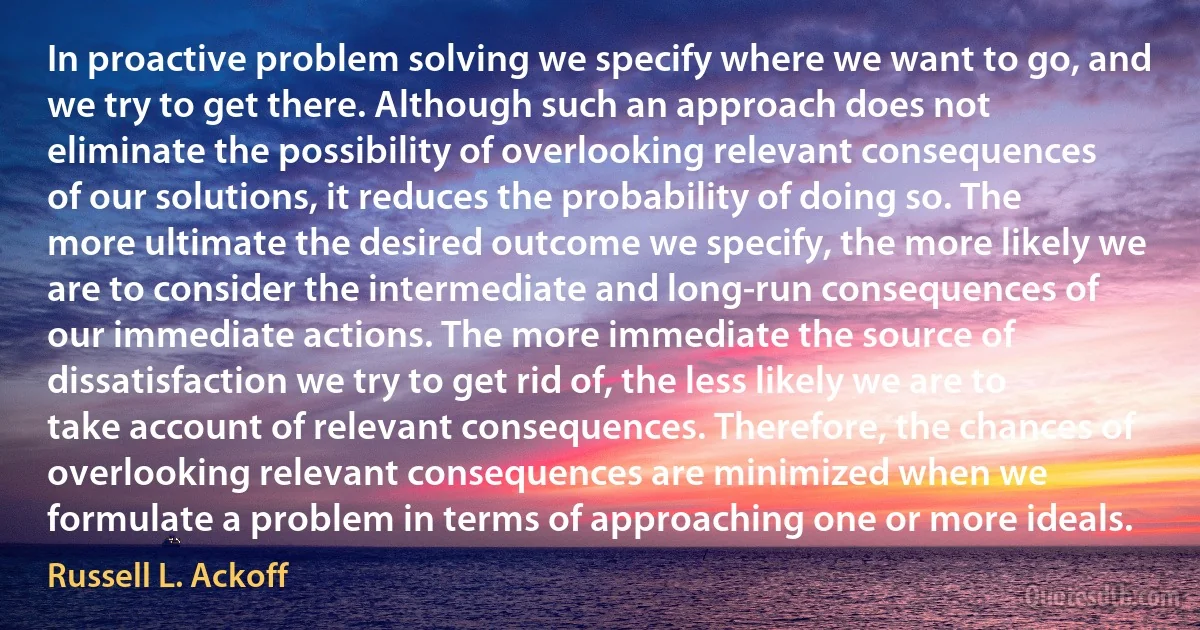
In proactive problem solving we specify where we want to go, and we try to get there. Although such an approach does not eliminate the possibility of overlooking relevant consequences of our solutions, it reduces the probability of doing so. The more ultimate the desired outcome we specify, the more likely we are to consider the intermediate and long-run consequences of our immediate actions. The more immediate the source of dissatisfaction we try to get rid of, the less likely we are to take account of relevant consequences. Therefore, the chances of overlooking relevant consequences are minimized when we formulate a problem in terms of approaching one or more ideals.
Russell L. AckoffRelated topics
account approach dissatisfaction intermediate less likely possibility probability problem rid solving source take try ultimateRelated quotes
The promise I made when I went to Ferguson and at the time that we launched our investigation was not that we would arrive at a particular outcome, but rather that we would pursue the facts, wherever they led. Our investigation has been both fair and rigorous from the start. It has proceeded independently of the local investigation that concluded in November. And it has been thorough: as part of a wide-ranging examination of the evidence, federal investigators interviewed and re-interviewed eyewitnesses and other individuals claiming to have relevant information and independently canvassed more than 300 residences to locate and interview additional witnesses.

Eric Holder
Between 1937 and 1941, Dobzhansky went from being able to allow for the possibility of evolutionary mechanisms other than those he favored to a position in which everything that did not fit his definition of evolution was rejected.
In the midst of his outpouring of anger at and dismissal of Goldschmidt, Dobzhansky neglected to consider the fact that while Goldschmidt's systemic mutations may not have been observed, neither had the mechanisms of speculation that he, or anyone else, for that matter, had proposed. ...it was and still is the case that, with the exception of Dobzhansky's claim about a new species of fruit fly, the formation of a new species, by any mechanism, has never been observed.

Theodosius Dobzhansky
I thank warmly the friends who remained loyal to me through the most difficult hours of my life. I do not name anyone in particular because I cannot name them all.
However, I consider myself justified in making an exception in the case of my companion, Natalia Ivanovna Sedova. In addition to the happiness of being a fighter for the cause of socialism, fate gave me the happiness of being her husband. During the almost forty years of our life together she remained an inexhaustible source of love, magnanimity, and tenderness. She underwent great sufferings, especially in the last period of our lives. But I find some comfort in the fact that she also knew days of happiness.

Leon Trotsky
To the biologist the problem of socialism appears largely as a problem of size. The extreme socialists desire to run every nation as a single business concern. I do not suppose that Henry Ford would find much difficulty in running Andorra or Luxembourg on a socialistic basis. He has already more men on his pay-roll than their population. It is conceivable that a syndicate of Fords, if we could find them, would make Belgium Ltd. or Denmark Inc. pay their way. But while nationalization of certain industries is an obvious possibility in the largest of states, I find it no easier to picture a completely socialized British Empire or United States than an elephant turning somersaults or a hippopotamus jumping a hedge.

J. B. S. Haldane
Consider your state of mind-your consciousness-before going to sleep. This is extremely important. Make a commitment to spend at least fifteen minutes spiritualizing your consciousness before going to bed. Read something spiritual, listen to spiritual discourse or music, or engage in discussion on a spiritual topic. Push aside the chaos and confusion that were a part of your day, and focus on spiritual reality. In this way, you will prepare yourself for the next six to eight hours of sleep. If you allow yourself to focus spiritually, you will provide less of an opportunity for negative elements to enter your dreams. You can then benefit most from your sleeping state.

Bhakti Tirtha Swami
